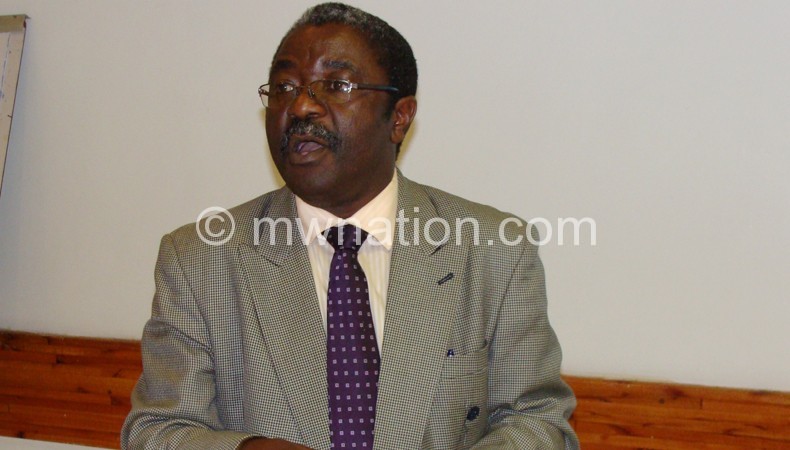No solution to Section 65

A month before another National Assembly is sworn in, the differences in opinion on the successful implementation of Section 65—a provision in the Malawi Constitution that aims at ensuring allegiance accountability in the House —remain as contentious as the controversy it has authored during the last 20 years of democratic rule.
Associate Professor of Law at Chancellor College of the University of Malawi, Edge Kanyongolo, believes that the provision will be successfully implemented only when the title deeds of execution are removed from the hands of the Speaker of the National Assembly, in his view, an interested party.
Henry Chimunthu Banda—Speaker of the National Assembly that got dissolved on March 20—recommended a review of the relationship between the Offices of the Speaker and of Attorney General and the timing of courts’ intervention on matters involving Section 65 as a solution.
However, Attorney General Anthony Kamanga believes the constitutional provision will only be successfully implemented when political parties and members of Parliament stop pursuing “narrow, selfish and personal interests at the expense of those of the nation.”
The Democratic Progressive Party (DPP) —the only political party which is committing in its manifesto to implementing Section 65 during its administration – says the piece of legislation needs to be modified to remove the conflicts it has with other provisions of the Constitution, which give rise to legal challenges.
Commenting on the DPP commitment, Kanyongolo argued in response to our questionnaire that Section 65 has no grey areas: “It is clear in what it says. I think what is needed is to remove the power to declare seats vacant from the Speaker who is a politician with vested partisan interests.”
In reaction, Chimunthu Banda said in a separate interview the problem he experienced as Speaker to implement the law arose from what he perceived as “premature” court interventions while the relationship between his office and that of the Attorney General (AG) did not guarantee objectivity.
“There were some of the most ridiculous experiences where the Office of the Speaker was even gagged to receive petitions from the aggrieved parties. I found this to be unreasonable. I thought interventions would come after the Speaker has made determinations of the petitions,” he complained.
A view that he has also made in his book, Chimunthu Banda observed that the relationship between the office of the Speaker and that of the AG needs to be reviewed so that in cases where conflict of interest arises, the Legislature must be allowed to seek advice from private lawyers.
The AG is, under the Constitution, expected to provide legal advice to the three arms of government—Executive, Legislature and Judiciary—and concerns bordering on objectivity of the office have arisen when advice has to be given where the arms find themselves in conflict.
In respect of implementing Section 65, concerns have been raised where the AG’s office has to advise the Speaker when mostly it is the sitting Head of State—an appointing authority of the AG—who is a beneficiary of the violations.
Kamanga parried this observation, saying his office—in all matters, including those regarding Section 65—has been objective. He added that where conflict of interest has arisen, his office has allowed the office of the Speaker to seek legal advice from private counsel.
“It is not true that Section 65 cannot be implemented because either there is something wrong with it or because the AG’s objectivity in respect of his or her advice is impaired,” argued Kamanga. “The truth is that politics holds implementation of the law hostage.”
“Injunctions are obtained because they are in the interest of the members of Parliament concerned and the parties they are defecting to. Unless the concerned members of Parliament and the parties involved change their mentality, Section 65 will remain captive,” he said, wondering how late Fred Nseula lost his seat if leaving the powers of implementation in the Speaker was a problem.
“It is the selfishness of the members of Parliament and the political parties which is the problem,” he added.
Defending his party’s recommendation that Section 65 should be reviewed, DPP running mate, Saulos Chilima, said the excuse that Section 65 in the current form is in conflict with the right to free association needs to be eliminated with an appropriate amendment.
“These loopholes are the ones that lead to difficulties in ensuring accountability among the members of Parliament,” said Chilima.
Section 65 has been one of the most contentious laws in the post-dictatorship period so much that during the first term of the DPP administration, its non-implementation climaxed into a crisis that held the National Budget in captivity.
Kanyongolo recommended that any party that comes to power after 20 May should prioritise reversing the amendments that were made in 2001 which extended Section 65 to cover MPs who resign from their parties, even if they do not join any other party, and those who join any organisation or association that has political objectives.





